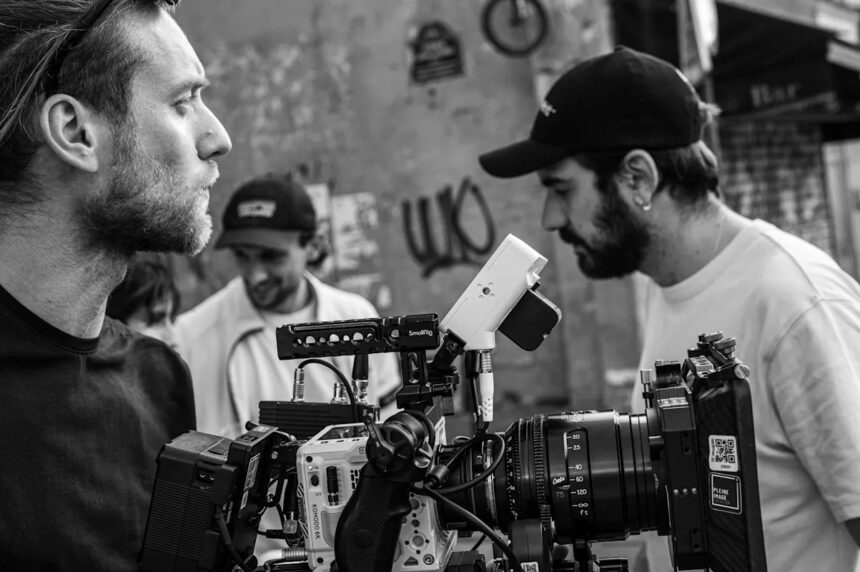Eight years ago, I could never have imagined I would be where I am today. The term “cinema” evokes thoughts of grand productions, Hollywood stars, and the artistry behind the scenes. Yet, behind every captivating scene, countless individuals work tirelessly to create moments that last mere seconds on screen. Among these dedicated professionals is Lester Beck, a multifaceted talent from Paris who has made his mark in New York as a cinematographer, gaffer, editor, and musician. In an exclusive interview with perlarico.com, Beck shares his inspiring journey of leaving France in search of the American dream and how he is now achieving success in the entertainment industry.
- How do you describe yourself?
- Lester: I consider myself a diligent worker who constantly seeks self-improvement and efficiency in both my professional and personal life. Social connections are crucial in this industry, as they often lead to job opportunities.
- What motivated your move to New York?
- Lester: While in film school, I was presented with an option to spend an additional year studying in New York. My admiration for the city inspired me to seize this opportunity. Initially planning to stay for just one year, I soon learned about the Optional Practical Training (OPT) program that allowed foreign students to extend their visas and work legally in their field. After two years of networking and gaining experience, I was able to apply for an O-1 artist visa, which requires substantial proof of significant contributions to the industry. Now, three years later, I am thriving in New York.
- What has your experience been like working in New York?
- Lester: New York is undoubtedly a hub for film work. Even as a newcomer without connections or family here, I found ample job opportunities early on. The city is known for giving people chances.
- How did your passion for cinema begin?
- Lester: My interest began in childhood when I experimented with my mother’s tape camera. Creating videos with friends during vacations sparked my love for filmmaking. In high school, I started making music videos, which ultimately led me to pursue film school.
- Is being a Director of Photography (DP) stressful or enjoyable?
- Lester: It encompasses both aspects. Preparing for shoots involves problem-solving and ensuring all technical needs are met, which can be stressful. However, once we set up the scene and lighting, the stress dissipates, and I find immense joy in my work.
- What career highlights stand out for you?
- Lester: I’ve had the privilege of working on independent films with talented directors and notable actors as a DP. In commercials, I’ve collaborated with prestigious brands like UPS, Huggies, Mercedes, Porsche, Smartwater, Nike, Air Jordan, Converse, Four Seasons, AT&T, T-Mobile, Puma, Alexander Wang, Tiffany & Co and Play-Doh—experiences that greatly enhance my résumé.
- How has your experience been as an editor and actor?
- Lester: I’ve always enjoyed editing my own videos since childhood and adapted easily to software like Final Cut and Premiere as technology evolved. While I now focus on editing my projects due to its unique challenges when working for others, acting has provided an intriguing perspective since I’m usually behind the camera.
- Can you elaborate on your role as a gaffer?
- Lester: As a gaffer, I am the right hand of the DP and oversee the lighting department. My responsibilities include determining how to light scenes based on the desired mood set by the director while managing all lighting equipment and electrical needs on set.
- What about your role in the Electrical Department? Is it challenging?
- Lester: The Electrical Department focuses on lighting setups that can vary in difficulty depending on the scene’s requirements. With experience comes familiarity with common setups across various projects.
- Which role do you enjoy most?
- Lester: Being a Director of Photography is my favorite because it represents the pinnacle of what I love about filmmaking. While gaffers lead lighting departments, DPs must possess extensive knowledge of lighting while also making crucial decisions about camera movements and shot composition alongside directors.
- How do you balance various types of productions?
- Lester: Each type of production demands different lighting techniques—narrative projects often focus on contrast and realism; music videos allow for more creative expression; while commercials typically require clean aesthetics.
- Have you faced challenges on set that required quick thinking?
- Lester: Absolutely! We often refer to Murphy’s Law—anything that can go wrong will go wrong—in filmmaking. Being prepared with contingency plans is essential.
- Do you feel you’ve achieved the American dream?
- Lester: I’m proud of where I am today; eight years ago, this seemed unimaginable. Each time I reach a goal, new aspirations emerge—my drive for success remains strong.
- What does your family think about your journey?
- Lester: They are proud of my accomplishments in the U.S., which is quite impressive back home in France. While it feels like my own life choices were not extraordinary, they required hard work and dedication.
- What advice would you give aspiring filmmakers?
- Lester: The path is challenging—there’s no job security and long hours—but if filmmaking is your passion, persistence will lead to success. Many enter this field because it seems glamorous; true motivation must come from love for the craft.
- To whom do you attribute your achievements?
- Lester: While family support has been invaluable, my success in New York’s film industry stems from my choices and efforts alone. Building trust through demonstrated competence is crucial; ultimately, my achievements are dedicated to making my mother proud.
Thank you, Lester Beck, for sharing your inspiring journey from Paris to New York—a testament that with determination and hard work, anyone can succeed in their dreams within the entertainment industry.
You can explore more about Lester’s work at his IMDb profile and follow his journey on Instagram @lesterblueberry.








